Something went wrong!
Hang in there while we get back on track
Best attractions in Arezzo
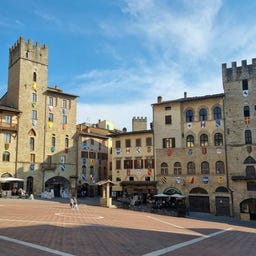
The Piazza Grande in Arezzo is the heart of this charming city and one of Tuscany’s most picturesque squares. Surrounded by notable Renaissance architecture, including the Palazzo delle Logge designed by Giorgio Vasari, the square is remarkable for its sloping layout and the seamless blend of buildings from different periods.
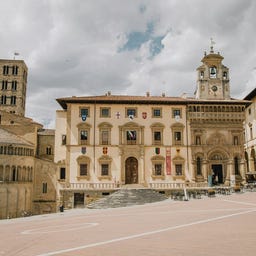
The Chiesa di Santa Maria della Pieve in the heart of Arezzo impressively combines Romanesque and Gothic architectural elements and has a history that dates back to 1009. The distinctive bell tower, with its 80 windows, is aptly called the "Tower of a Hundred Holes" and was completed in 1330. In the three-nave church, you can find art historical treasures like the polyptych by Pietro Lorenzetti from the 14th century and the baptismal font by Giovanni d'Agostino. The remarkable façade, featuring three richly decorated portals and four stacked levels, was created in the 13th century and is considered one of the most impressive examples of Tuscan church architecture.
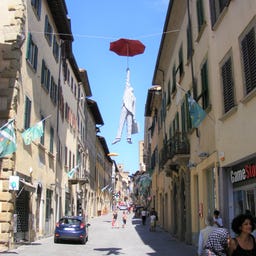
Corso Italia is Arezzo's main shopping street with a mix of artisanal shops, cafes, wine bars and boutiques. Discover handmade crafts, Italian jewellery and leather goods to commemorate your visit to Arezzo. Its a great city to find unique souvenirs and precious gifts. The cross-street of Via Cavour and Via Garibaldi is also full of shops.
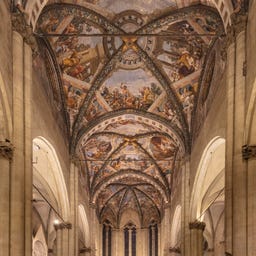
High above the Tuscan town stands the Cattedrale dei Santi Pietro e Donato, whose history dates back to the early 13th century when Pope Innocent III ordered the relocation of the original cathedral within the city walls.
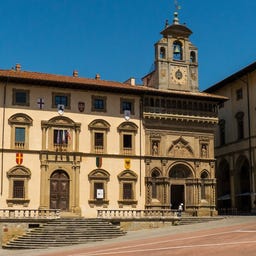
The Clock Tower in Arezzo, located on the Piazza Grande, is accessible through the Palazzo di Fraternita dei Laici. This tower is renowned for its astronomical clock, among the oldest functioning clocks in Italy, created in 1552 by the master watchmaker Felice di Salvatore da Fossato. The clock is part of a facade designed by Giorgio Vasari, featuring a unique system that includes three bells managed through complex mechanisms. This clock offers not only the time but also astronomical data, according to the Ptolemaic conception of the universe.
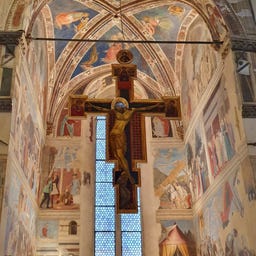
In the Tuscan city of Arezzo, you can discover the Basilica di San Francesco, an architectural gem from the early 14th century that serves both as a place of worship and a state museum. The simple Romanesque facade is deceiving – inside the single-nave basilica, you'll find significant frescoes from the 14th to 16th centuries, including works by Spinello Aretino and Giovanni di Ser Giovanni.
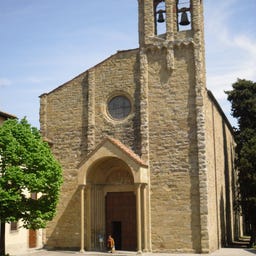
The Basilica of San Domenico is a Gothic-style church located in Arezzo. It is dedicated to St. Dominic and is particularly renowned for containing a painted crucifix by Cimabue from 1265. This piece is noted for its historical importance due to Cimabue's stylistic innovation; he deviated from the Byzantine conventions of his time, introducing greater expressionism with themes of death, empathy, and humanism. The basilica itself was constructed between the 13th and 14th centuries, characterized by a sober and minimalistic architectural style.
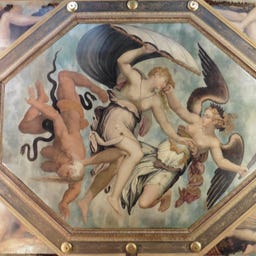
Step into the world of the famous Renaissance artist and architect Giorgio Vasari (1511-1574). His accomplishments include designing the tomb of his friend, Michaelangelo as well as the loggia of the Palazzo degli Uffizi in Florence and the passage that connects the Uffizi with the Palazzo Pitti. He was also made Knight of the Golden Spur by the Pope. Vasari built his residence in 1547 himself and today this museum showcases Vasari’s works and provides insight into his life. Explore the art-filled rooms and gain a deeper understanding of the Renaissance period in Arezzo. Note: The museum is closed on Tuesdays.
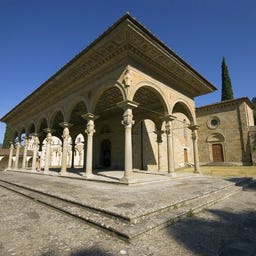
In the Tuscan city of Arezzo, you can discover the Chiesa di Santa Maria delle Grazie, a fascinating example of late Gothic architecture built by Domenico del Fattore between 1435 and 1444. This historic site was once home to an Etruscan-Roman sanctuary dedicated to Apollo, where the preacher Bernardino da Siena had an oratory constructed in 1428.
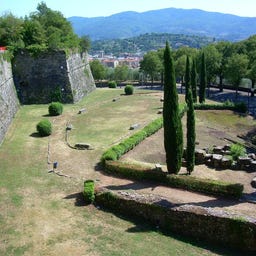
High above Arezzo stands the Fortezza Medicea, an impressive fortress from the 16th century that offers you a spectacular panoramic view of the city and the surrounding valleys. The current structure was built between 1538 and 1560 under Cosimo I de' Medici based on designs by Giuliano and Antonio da Sangallo, with the construction requiring the demolition of 17 churches.
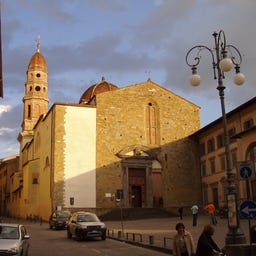
In the historic old town of Arezzo, you will find the Badia delle Sante Flora e Lucilla, an impressive church that combines elements of Gothic and Renaissance architecture. The current structure dates back to 1278 and was extensively remodeled in the 16th century under the guidance of Giorgio Vasari.
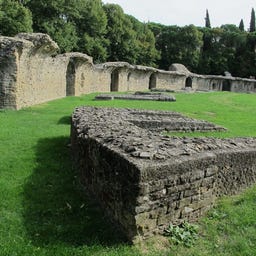
In the southern part of the historic Arezzo, you will find an impressive testament to Roman architecture: the elliptical amphitheater from the 1st/2nd century AD, which once accommodated up to 10,000 spectators. With its dimensions of 121 x 68 meters and its construction of sandstone, bricks, and marble, it was one of the more significant arenas of its time—only slightly smaller than the Colosseum.
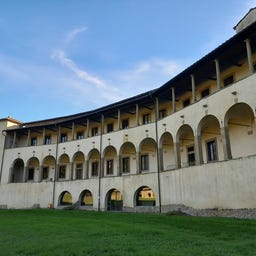
The "State Archaeological Museum Gaio Cilnio Mecenate" is the most important archaeological museum in Arezzo.
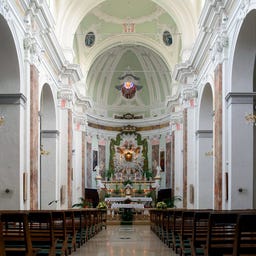
The Chiesa di Sant'Agostino impressively combines Romanesque, Rococo, and Baroque elements and has a rich history that began with its foundation in 1257. Inside, you will discover significant artworks from various periods, including frescoes by Barna Senese and Luca Signorelli, as well as a remarkable wooden crucifix from the 17th century.
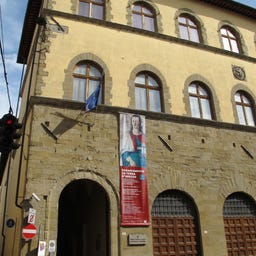
In the magnificent Renaissance palace Palazzo Bruni-Ciocchi, designed by architect Bernardo Rossellino, you will find an impressive collection of Italian art from the early Middle Ages to the 19th century.

In the Tuscan city of Arezzo, you will find the Chiesa della Santissima Annunziata, an impressive example of Renaissance architecture with a history that dates back to a miracle in 1490. The construction of the church began in 1491 under Bartolomeo Della Gatta and it houses the famous "Madonna delle Lacrime" - a miraculous statue of Mary by Michele da Firenze, which originally stood in the Hospital San Cristoforo.
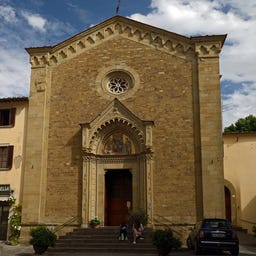
The Chiesa di San Michele in Arezzo has a rich history that dates back to 1095, when it was built as a Lombard church outside the city walls. In the 14th century, the building underwent a significant transformation in the Gothic style, followed by further renovations in the 15th century and a complete redesign by architect Giuseppe Castellucci in 1934.
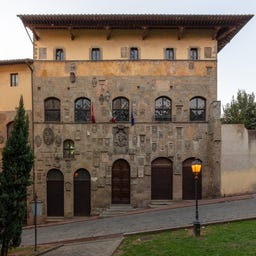
In the historic center of Arezzo stands the impressive Palazzo Pretorio, which was created in the 13th century through the merging of several noble palaces belonging to the Guelph families Albergotti, Lodomeri, and Sassoli. Its facade is adorned with numerous coats of arms representing the Podestà and captains who served in Arezzo since the early 15th century.
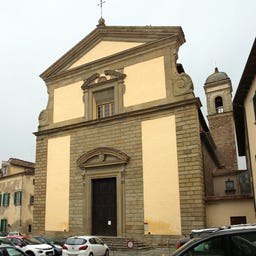
The Chiesa di Santa Maria a Gradi in Arezzo has a history that spans almost a thousand years, starting with a Camaldolese monastery in 1043. The current church building was constructed between 1591 and 1611 and impresses with its facade designed by Bartolomeo Ammannati, which skillfully combines simple and decorative elements.
The Alpe di Poti, the local mountain of Arezzo, has a rich history that spans from the 6th century to the present day. It served as part of the Byzantine defense line against the Lombards and later became the site of dramatic events during World War II, with historical moments shaping this mountain complex, including its peaks Monte Favalto and Monte Dogana.
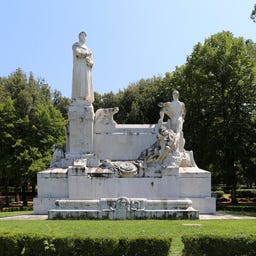
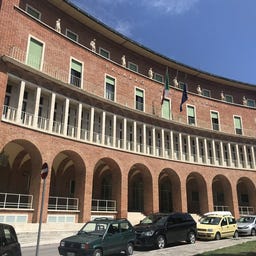
The Palazzo del Governo, designed by architect Giovanni Michelucci in the late 1930s, is one of the most significant examples of fascist architecture in Italy. This impressive complex, which includes the prefecture, police headquarters, and a ceremonial hall, captivates with its balanced proportions and the combination of brick, travertine, and simply plastered facades.
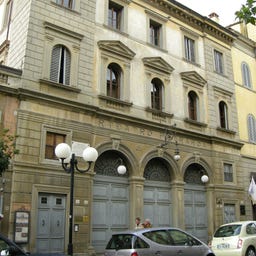
In the historic center of Arezzo, you'll find the Teatro Petrarca, a classic Italian theater from the early 19th century named in honor of the poet Francesco Petrarca. Opened in 1833 with Donizetti's "Anna Bolena," the theater features a horseshoe-shaped auditorium and four tiers of boxes, accommodating 461 visitors after its recent renovation in 2015.
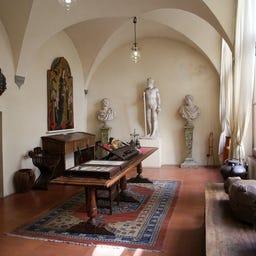
In the historic Palazzo del Capitano del Popolo in Arezzo, you discover the fascinating world of the antique dealer Ivan Bruschi, who lovingly restored the war-damaged building after 1943. The passionate collector, who co-founded the famous Fiera Antiquaria in 1968, lived in the palace until his death in 1996 and left his extensive collection for future generations.
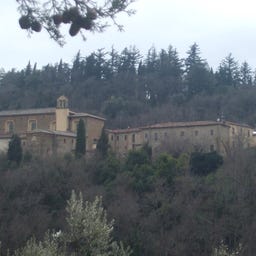
Just 2 km from Arezzo, you will find the Convento di Sargiano, a historic monastery from the early 15th century, founded with the help of Saint Bernardino of Siena. In the main cloister, you can admire the impressive painting "Jesus is Served by Angels in the Desert" by Giovanni Mannozzi, while the monastery church houses a remarkable crucifix from the 17th/18th century.
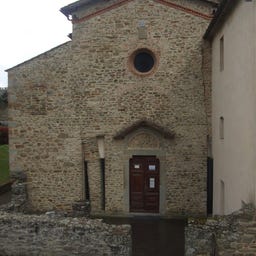
Near Arezzo, you will discover the Pieve di Sant'Eugenia al Bagnoro, one of the most significant medieval parish churches in the diocese of Arezzo-Cortona-Sansepolcro. The church, first documented in 1012, was once the mother church for nine smaller places of worship, of which seven still exist today.
The 835-meter-high Monte Lignano stands out as a prominent peak of the Tuscan pre-Apennines southeast of Arezzo. From its summit, you can enjoy a sweeping panoramic view of the Val di Chiana, Casentino, the Tuscan-Romagnol Apennines, and Lake Trasimeno. The mountain offers an extensive network of hiking trails through shady forests, the popular Lignano Park with barbecue spots under the trees, and the nearby Lignano Zoo. In the area, you'll find historical treasures like the Pieve di Sant'Eugenia, the Castello di Policiano, and the "Traccia di San Francesco" - a spring believed to have originated from a miracle of Saint Francis of Assisi.
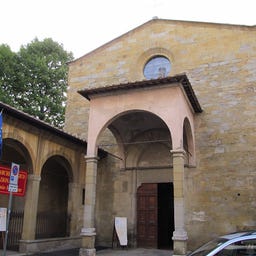
The "Church of San Bernardo" is a sacred building in Arezzo.
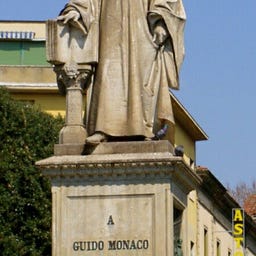
The "statue of Guido Monaco" is a work by the sculptor Salvino Salvini located in the center of the square of the same name in Arezzo.
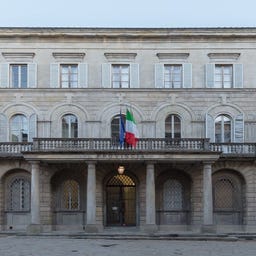
The "Palazzo della Provincia" is a building located between via Ricasoli, 44-50 and via dell'Orto, 7 in Arezzo, currently housing the Province of Arezzo.
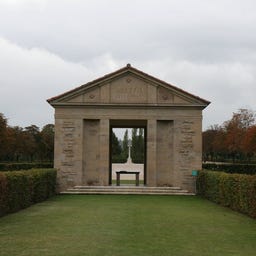
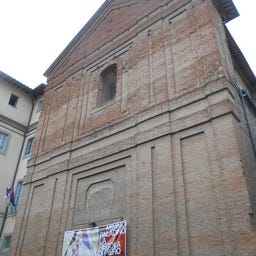
"Sant’Ignazio" in the Tuscan city of Arezzo is a former Jesuit church.
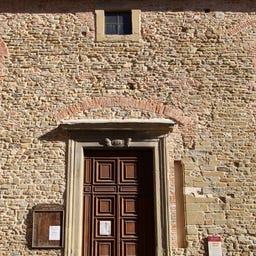
The "Church of San Pier Piccolo" is a church in Arezzo located on Via Cesalpino.
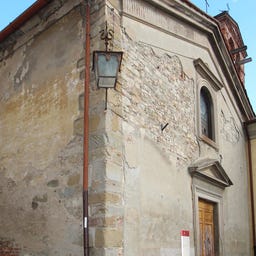
The "Church of San Lorenzo" is one of the oldest sacred buildings in Arezzo. The church gives its name to the square that hosts it.
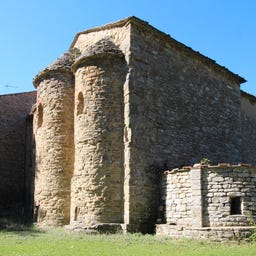
High above the Valtiberina valley stands the Badia di San Veriano, a former monastery with a history dating back to 1095. The abbey, once run by Camaldolese monks, was converted into a simple parish church in 1652.
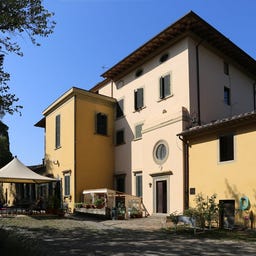
"Villa La Striscia," or "Villa Occhini," is a historic building in Arezzo, located at Via dei Cappuccini 3, in the immediate surroundings of the city, at the foot of the San Fabiano hill.
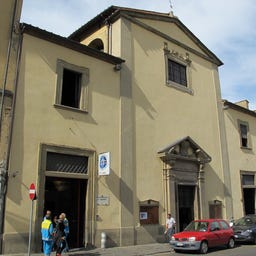
The "Church of the Holy Trinity" is a Catholic place of worship located in the historic center of Arezzo, situated along via Garibaldi, formerly known as "via Sacra," facing piazza del Popolo. The place of worship and the adjoining premises are home to the Archconfraternity of Mercy of Arezzo, which is why the church is also referred to as "of Mercy."
The "Teatro Comunale Pietro Aretino" is a theater in Arezzo designed by Alessandro Mendini. It rises from the ashes of the historic "Teatro Comunale della Bicchieraia."

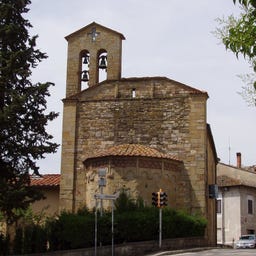
The "Church of Santa Croce" is a Catholic place of worship in the city of Arezzo, located on the street of the same name.
The "Palazzo del Genio Civile" is a building located at via Fra' Guittone 2-4 in Arezzo.
The "Church of San Bartolomeo" is one of the oldest sacred buildings in Arezzo.
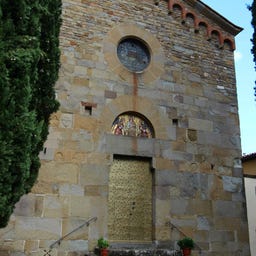
The "Church of Sant'Agnese" is a church in Arezzo.
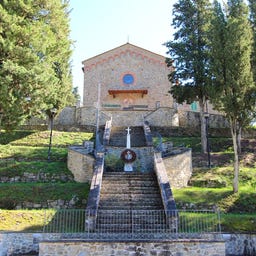
The "Pieve di San Donnino a Maiano" is a church in Arezzo located in the area of Palazzo del Pero.
The "Palazzo delle Poste" is a building located at via Guido Monaco, 34 in Arezzo.
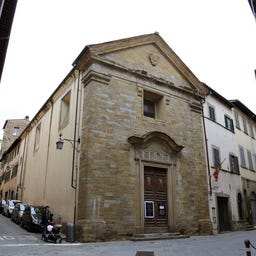
The "Church of Saints Lorentino and Pergentino" is a monument in Arezzo.
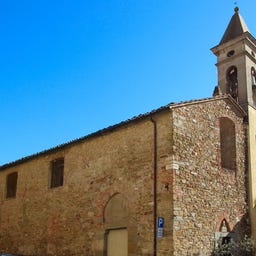
The "Church of San Gimignano" is a sacred building in Arezzo.
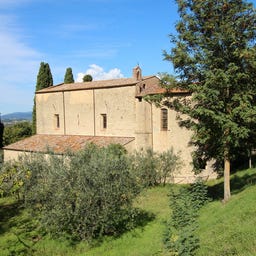
The "sanctuary of Madonna del Giuncheto" is a church in Arezzo located in the San Polo area.
The "Church of Sant'Antonio Abate in Saione" is a place of worship in Arezzo located at Via Vittorio Veneto, 109. It falls within the territory of the parish of San Francesco Stigmatizzato, whose parish church is situated in Piazza Saione.
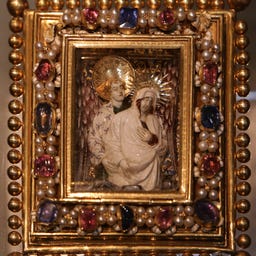
In the venerable Palazzo Vescovile of Arezzo, you will discover an impressive collection of sacred art from the 12th to the 19th century. The museum, founded in 1963, showcases precious wooden crucifixes, bronze incense burners, and works by notable artists such as Andrea di Nerio and Spinello Aretino in five rooms.
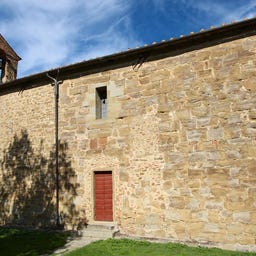
The "Church of Santa Maria Assunta in Puglia" is a church in Arezzo located in the Puglia area.
The "Pieve dei Santi Quirico e Giulitta" is a church in Arezzo located in the Battifolle area of the municipality of Arezzo.
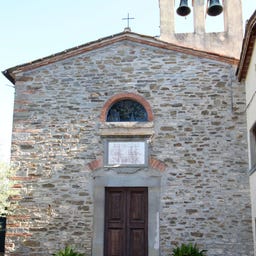
The "Church of San Giovanni Battista in San Firenze" is a church in Arezzo located in the San Firenze area.
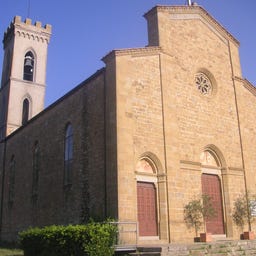
The "Church of Sant'Andrea a Pigli" is a church in Arezzo located in the area of Pigli.
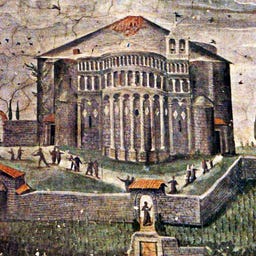
On a hill southwest of Arezzo, you will discover the Parco Colle del Pionta, a 12-hectare park that preserves the remnants of the city's first Christian center. Here stood the original cathedral of Arezzo, the Duomo Vecchio, until the 13th century, before it was rebuilt within the city walls.
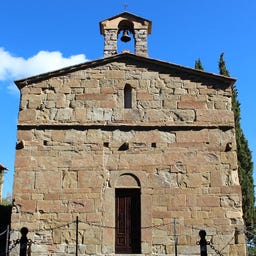
The "Church of San Severo" is a church in Arezzo located in the area of the same name.
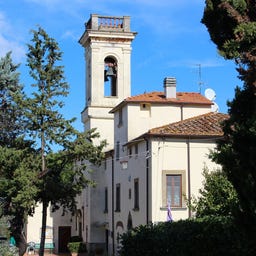
The "Church of Saints Peter and Paul" is a church in Arezzo located in the district of Campoluci.
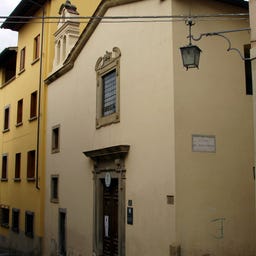
The "Church of San Giuseppe" is a Catholic place of worship in the city of Arezzo.
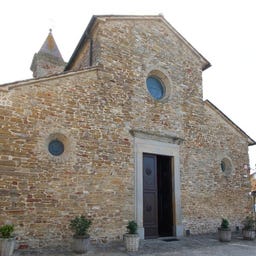
The "Pieve di Santa Maria alla Chiassa" is a church in Arezzo located in the Chiassa area.
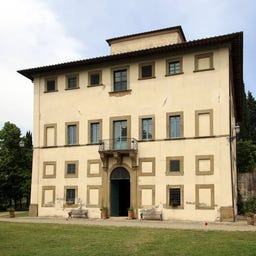
"Villa il Cicaleto" is a civil building in Arezzo, located at 31 Sargiano Street.
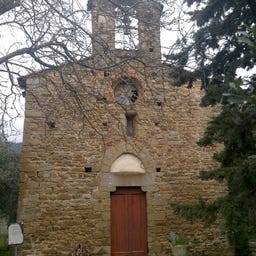
The "Church of San Clemente in Pigli" is a church in Arezzo located in the Pigli area.
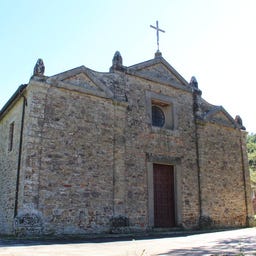
The "Pieve dei Santi Lorentino e Pergentino a Ranco" is a church in Arezzo located in the area of Pieve a Ranco.
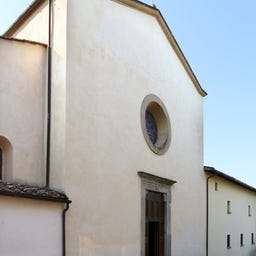
The "Church of Santo Stefano dei Cappuccini" is a church in Arezzo located on Via Santo Stefano.
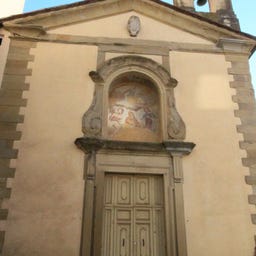
The "Church of San Sebastiano" is a church in Arezzo located at the top of the Murello slope.
The "Church of Santa Caterina" is a church in Arezzo located on Via Cesalpino.
